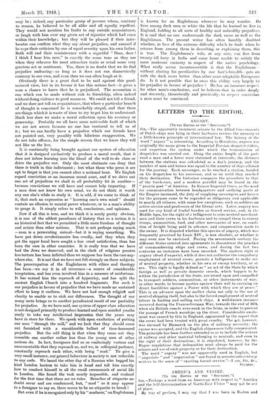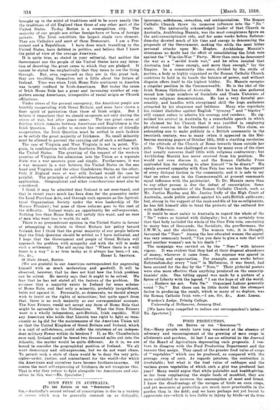AMERICA AND ULSTER. .
[To THE EDITOR OF THE " SPECTATOR."] Sia,—Perhaps a word from an American with respect to " America and the Self-Determination of North-East Ulster " may not be out of place. By way of preface, I may say that I was born in Boston and
brought up in the midst of traditions said to be more nearly like the traditions of old England than those of any other part of the United States. To-day Boston is a cosmopolitan city. The majority of our people are either foreign-born or born of foreign parents. The Irish constitute the largest single race element. They are Catholics and most of them Democrats. I am a Pro- testant and a Republican. I have done much travelling in the United States, have dabbled in politics, and believe that I know the point of view of the average American.
It is quite true, as stated in your editorial, that neither the Government nor the people of the United States have any inten- tion of deserting the great cause to which they are pledged. It cannot be stated too emphatically that they mean to see the thing through. But, even engrossed as they are in this great task, they are troubling themselves not 'a little about the future of Ireland. Time was when Irish Home Rule sentiment in America was largely confined to Irish-Americans. But to-day the cause of Irish Home Rule has a great and increasing number of sup- porters among Americans, irrespective of racial origin or Church affiliations.
Under stress of the present emergency, the American people are heartily co-operating with Great Britain, and none have shown a finer spirit of patriotism than those of Irish origin. But I believe it important that we should co-operate not only during the stress of war, but after peace comes. The one great cause of friction which remains between Americans and Englishmen is the Irish Question. In order to ensure the continuance of friendly co-operation, the Irish Question must be settled in such fashion as to satisfy the great majority of Irishmen. No small minority must be allowed to prevent the carrying out of such a settlement.
The case of Virginia and West Virginia is not in point. Vir- ginia, in combination with other Southern States, was at war with the United States. The granting of the request of the western counties of Virginia for admission into the Union as a separate State was a war measure pure and simple. Furthermore, it was a war measure in a war between the United States on the one hand and Virginia and the other Confederate States on the other. Only if England were at war with Ireland would the case be parallel. The principle of self-determination is not of universal application. Geographical and other considerations must also be considered.
I think it may be admitted that Ireland is not over-taxed, and that in recent years much has been done for the peasantry under the Land Purchase Acts, and through such agencies as the Agricul- tural Organization Society under the wise leadership of Sir Horace Plunkett; but none of these reforms goes to the root of the difficulty. Ireland wants an opportunity for self-expression. Nothing less than Home Rule will satisfy this want, and no race of men who want less is worth its salt.
There is no preponderant opinion in the United States in favour of attempting to dictate to Great Britain her policy toward Ireland, but I think that the great majority of our people believe that the Irish Question should be settled as I have indicated, and I hope that the Government and people of Great Britain will approach the problem with sympathy and with the will to make such a settlement. The old saying that " Where there is a will there is a way " is as true to-day as it always has been.—I am, [We are grateful to our American correspondent for expressing himself with so much moderation and goodwill. It will be observed, however, that he does not hint how the Irish problem can be solved. He merely says that it ought to be solved. We fear that he has not stated all the factors of the problem. He assumes that a majority exists in Ireland for some scheme of Home Rule, and that only a minority, probably insignificant, holds out against it. Personally, as democrats, we should always wish to insist on the rights of minorities; but quits apart from that, there is no such majority as our correspondent assumes. The Sinn Feiners would not accept any form of Home Rule that might be agreeable to the Nationalists. What the Sinn Feiners want is a wholly independent, anti-British, Irish republic. Will any American who holds that Lincoln was right to fight as tena- ciously as hg did for the maintenance of the American Union tell us that the United Kingdom of Great Britain and Ireland, which is a unit of self-defence, could suffer the existence of an indepen- dent military Power within its borders ? If, as Mr. Chamberlain once said, Ireland could be towed two thousand miles out. into the Atlantic, the matter would be quite different. As it is, we are bound to consider the geographical position of Ireland. We all want democracy and self-expression, but we do not want chaos. To permit such a state of chaos would be to deny the very prin- ciples—order, justice, and contentment for the world—for which the Americans and ourselves have become brothers-in-arms. Of course the most self-expressing of Irishmen do not recognize this. That is why they refuse to fight alongside the Americans and our- selves in this war.—ED. Spectator.]



































 Previous page
Previous page